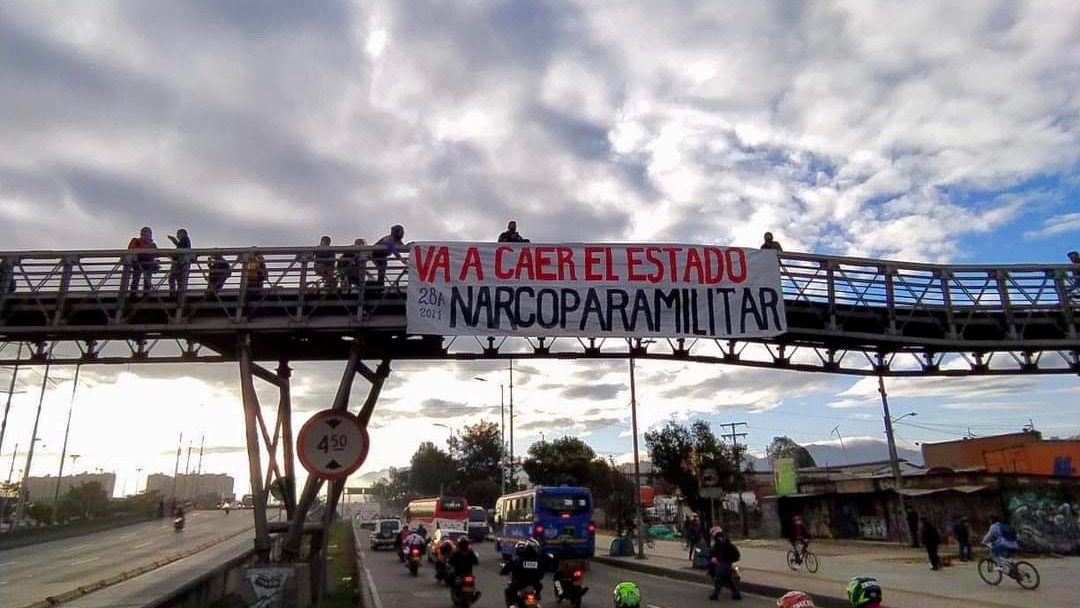Colombian citizens, members of trade unions, social movements and opposition political parties are participating in a national strike in cities and towns across the country today, on April 28. The protest actions have been called in rejection of the Sustainable Solidarity bill, a new tax reform bill presented to the Congress by the far-right government of president Iván Duque to finance the economic crisis or compensate for the fiscal deficit incurred due to the COVID-19 pandemic.
The marches, demanding the withdrawal of the reform, will begin at 9:00 local time in the main cities of the country. In the capital Bogota, the protesters will gather at the National Park and will march from there to the Bolívar Plaza. The organizers of the national strike and nationwide mobilizations have called on the demonstrators to follow all biosecurity protocols in place with greater responsibility to avoid the contagion of COVID-19. Organizations have also organized blockades of major highways and roads across national territory as well as other actions to manifest their rejection of the far-right government’s policies.
📌En Sameco Cali Valle del Cauca, se registra bloqueo #EsElMomentoDeParar28A #VivaElParoNacional28A pic.twitter.com/MLVvZTsQR4
— Central Unitaria de Trabajadores #ParoNacional28A (@cutcolombia) April 28, 2021
Yesterday, on April 27, various leaders of the National Strike Committee, which brings together a diverse group of social organizations and trade unions, and the Unitary National Command, the country’s trade union center which is made up of the Central Union of Workers (CUT), the Confederation of Workers of Colombia (CTC), the General Confederation of Labor (CGT), the Colombian Federation of Education Workers (Fecode), the Confederation of Pensioners of Colombia (CPC) and the Domestic Confederation of Pensioners (CDP), ratified their intention to take to the streets and go forward with the strike as planned, despite the efforts by government authorities to make it illegal and suspend it.
In the past days, various government authorities such as the Ministry of Health and the Attorney General’s Office, have called to postpone the mobilizations due to the third wave of coronavirus in the country. Yesterday, a day before the strike, in a desperate attempt, the Administrative Court of Cundinamarca suspended the right to public protest on April 28 and May 1, revoking permissions for anti-government protests and Labor Day celebrations. The decision was widely rejected by trade unions, social sectors and the opposition. Following the court orders, the Ministry of Defense called on the people to not participate in the mobilizations.
La Campaña Defender la Libertad (the Defend Freedom Campaign), a network of social organizations that denounce arbitrary detentions, judicial persecution and criminalization of social protest in Colombia, condemned the order and emphasized that “it ignores the jurisprudence and the international norms in force on the matter (right to protests), since only the law can limit the exercise of the protest.” The organization highlighted that “the protest cannot be suspended even under states of emergency. Therefore, the Court’s measure violates guarantees of due process and due notification to interested parties.” It added that “these orders are not enforceable for citizens, since they can exercise the right to protest without prior permission.”
The campaign pointed out that “despite the court orders, the Colombian state has a legal duty to provide protection to protesters, even if the demonstration does not have the unnecessary prior “permission” and urged that “freedom and integrity must be guaranteed!” The organization pointed out that “the court orders do not sympathize with the reality of the country, the climate of dissatisfaction and imposes an unreal condition such as herd immunity, which is uncertain. Therefore, the measures become innocuous or empty, and unattainable by the citizenry.”
Read more: National strike announced in Colombia in response to neoliberal “solidarity” measures
Similarly, Francisco Maltés, the president of the CUT, affirmed that “the Constitutional Court has said that the right to protest is fundamental and can be exercised when citizens agree. It cannot be denied, much less terminated, by any authority, not even in times of emergency, or in the conditions of state of exception. For this reason, we do not need to ask for permission from any authority to exercise this legitimate right.” Maltés reiterated that “on April 28, we are going on a national, peaceful, orderly and non-belligerent strike to demand the abolition of the tax reform.”
Senator Gustavo Petro of the progressive Colombia Humana party, warned that the government’s attempts to ban protests seeks to “create confrontations between the people and the police.” “What we need to understand tomorrow is that the success of the strike does not only depend on the success of protests. It is more than anything the cessation of all activities,” added Petro.
The said controversial bill was presented by finance minister Alberto Carrasquilla on April 15, as a tool to allegedly alleviate poverty in the midst of the health and economic crisis. In the name of solidarity, the government seeks to pass a tax reform that increases the VAT on staple goods, fuel, and various public services; expands the tax collection base; increases the tax on agricultural inputs; increases the tax on pensions; freezes the wages in the public sector until 2026; eliminates subsidies on various public services; imposes toll tax on roads connecting countrysides with cities; among other measures.
The trade unions and social organizations denounced it as a hard blow to the middle class and deemed it as “Duque’s neoliberal package”. They stressed that it threatens the economic stability of workers, pensioners, and people with lower incomes, and will only increase poverty and inequality in the country.





